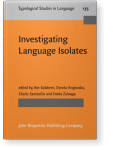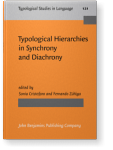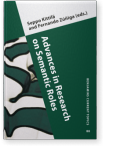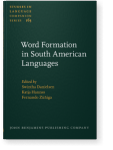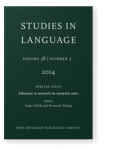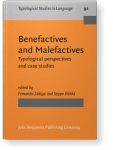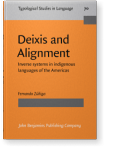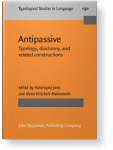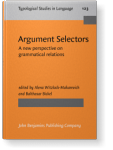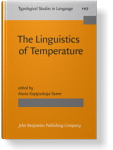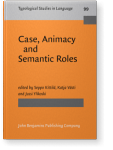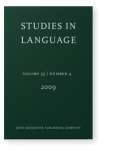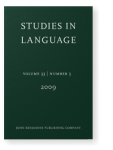Fernando Zúñiga
List of John Benjamins publications for which Fernando Zúñiga plays a role.
Book series
Typological Hierarchies in Synchrony and Diachrony
Edited by Sonia Cristofaro and Fernando Zúñiga
[Typological Studies in Language, 121] 2018. vi, 434 pp.
Subjects Historical linguistics | Theoretical linguistics | Typology
Advances in Research on Semantic Roles
Edited by Seppo Kittilä and Fernando Zúñiga
[Benjamins Current Topics, 88] 2016. v, 219 pp.
Subjects Semantics | Syntax | Theoretical linguistics
Word Formation in South American Languages
Edited by Swintha Danielsen, Katja Hannss and Fernando Zúñiga
[Studies in Language Companion Series, 163] 2014. v, 228 pp.
Subjects Languages of South America | Morphology | Syntax | Theoretical linguistics
Advances in research on semantic roles
Edited by Seppo Kittilä and Fernando Zúñiga
Special issue of Studies in Language 38:3 (2014) v, 211 pp.
Subjects Functional linguistics | Theoretical linguistics | Typology
Benefactives and Malefactives: Typological perspectives and case studies
Edited by Fernando Zúñiga and Seppo Kittilä
[Typological Studies in Language, 92] 2010. x, 440 pp.
Subjects Semantics | Syntax | Theoretical linguistics | Typology
Deixis and Alignment: Inverse systems in indigenous languages of the Americas
Fernando Zúñiga
[Typological Studies in Language, 70] 2006. xii, 309 pp.
Subjects Languages of North America | Languages of South America | Morphology | Semantics | Syntax | Typology
2021 Chapter 19. Antipassivization in Basque revisited Antipassive: Typology, diachrony, and related constructions, Janic, Katarzyna and Alena Witzlack-Makarevich (eds.), pp. 621–640 | Chapter
In this paper, we explore three phenomena that have been considered to be antipassives in Basque linguistics. First, we briefly review “ergative displacement” (Laka 1988), related to antipassives as mentioned by Heath (1976). This is not a bona fide instance of the antipassive, since the ergative… read more
2019 Grammatical relations in Mapudungun Argument Selectors: A new perspective on grammatical relations, Witzlack-Makarevich, Alena and Balthasar Bickel (eds.), pp. 39–67 | Chapter
This article presents the grammatical relations (GRs) of Central Mapudungun(unclassified, Chile and Argentina) as explored in terms of argument selectionas instantiated by different constructions (i.e., the coding and behavioral properties usually discussed in the literature on alignment). The… read more
2019 Grammatical relations in Basque Argument Selectors: A new perspective on grammatical relations, Witzlack-Makarevich, Alena and Balthasar Bickel (eds.), pp. 185–211 | Chapter
This article presents the grammatical relations (GRs) of Standard Basque (isolate, Spain and France) as explored in terms of argument selection as instantiated by different constructions (i.e., the coding and behavioral properties usually discussed in the literature on alignment). The language… read more
2018 Synchronic vs. diachronic approaches to typological hierarchies Typological Hierarchies in Synchrony and Diachrony, Cristofaro, Sonia and Fernando Zúñiga (eds.), pp. 3–28 | Chapter
2016 Recent developments and open questions in the field of semantic roles Advances in Research on Semantic Roles, Kittilä, Seppo and Fernando Zúñiga (eds.), pp. 1–26 | Article
This introductory chapter briefly introduces a few milestones in the voluminous previous literature on semantic roles, and charts the territory in which the chapters of this volume aim to make a contribution. This territory is characterized by fairly disparate conceptualizations of semantic roles… read more
2016 Benefaction proper and surrogation Advances in Research on Semantic Roles, Kittilä, Seppo and Fernando Zúñiga (eds.), pp. 109–131 | Article
The semantic role of beneficiary is usually conceptualized in very general terms, typically without an intensional definition of what can constitute a benefit in the particular construction under study. Among those accounts that have proposed to discuss benefaction as related to the notion(s) of… read more
2015 Temperature terms in Mapudungun The Linguistics of Temperature, Koptjevskaja-Tamm, Maria (ed.), pp. 776–791 | Article
Mapudungun (unclassified) is spoken in south-central Chile and southwestern Argentina at different altitudes in climates ranging from tundra and subalpine to Mediterranean. This paper surveys the basic semantics and morphosyntax of nine temperature terms, of which wütre ‘cold’, füshkü ‘cool’, eñum… read more
2014 Introduction and acknowledgments Word Formation in South American Languages, Danielsen, Swintha, Katja Hannss and Fernando Zúñiga (eds.), pp. 1–10 | Article
The term ‘word formation’ is ambiguous in modern linguistics. In one usage of the term, it is equivalent to ‘morphology’ and refers to matters such as affixation and reduplication as used in the creation of words. In the more widely accepted sense of the term, word formation refers to the creation… read more
2014 Recent developments and open questions in the field of semantic roles Advances in research on semantic roles, Kittilä, Seppo and Fernando Zúñiga (eds.), pp. 437–462 | Article
This introductory chapter briefly introduces a few milestones in the voluminous previous literature on semantic roles, and charts the territory in which the papers of this volume aim to make a contribution. This territory is characterized by fairly disparate conceptualizations of semantic roles… read more
2014 Nominal compounds in Mapudungun Word Formation in South American Languages, Danielsen, Swintha, Katja Hannss and Fernando Zúñiga (eds.), pp. 11–31 | Article
It is perhaps unsurprising that the rich agglutinative-polysynthetic verb morphology of Mapudungun has drawn most attention in linguistic studies. So far unnoticed in the literature are Mapudungun complex noun phrases, which show a puzzling distribution in terms of the internal structure they… read more
2014 Benefaction proper and surrogation Advances in research on semantic roles, Kittilä, Seppo and Fernando Zúñiga (eds.), pp. 543–565 | Article
The semantic role of beneficiary is usually conceptualized in very general terms, typically without an intensive definition of what can constitute a benefit in the particular construction under study. Among those accounts that have proposed to discuss benefaction as related to the notion(s) of… read more
2011 Why should beneficiaries be subjects (or objects)? Affaction and grammatical relations Case, Animacy and Semantic Roles, Kittilä, Seppo, Katja Västi and Jussi Ylikoski (eds.), pp. 329–348 | Article
The present paper proposes a semantico-pragmatic representation of benefactive situations according to which beneficiaries are affected participants that are peripheral with respect to an overtly expressed causing subevent but core participants with respect to a covert resulting subevent. Such a… read more
2010 Introduction: Benefaction and malefaction from a cross-linguistic perspective Benefactives and Malefactives: Typological perspectives and case studies, Zúñiga, Fernando and Seppo Kittilä (eds.), pp. 1–28 | Article
2010 Benefactive and malefactive applicativization in Mapudungun Benefactives and Malefactives: Typological perspectives and case studies, Zúñiga, Fernando and Seppo Kittilä (eds.), pp. 203–218 | Article
This paper argues that two productive applicatives in Mapudungun, viz. -(l)el and -ñma, can be labeled benefactive and malefactive respectively, but only in a superficially impressionistic way. Based on a detailed survey of the literature on the language, as well as on synchronic evidence and some… read more
2009 Review of Malchukov & Spencer (2009): The Oxford Handbook of Case Studies in Language 33:4, pp. 1019–1025 | Review
